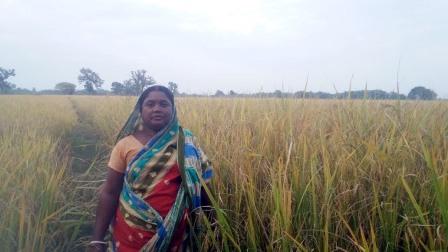Baripada: If you visit Kisanhadi village under Balidiha panchayat in Shamakhunta block of Mayurbhanj district, you will be greeted with a ubiquitous aroma.
By the time you identify the aroma with Basmati rice, you must have also known one Malakmani Singh— a female farmer whose produce of labour is spreading the aroma.
Malakmani has been harvesting about 40 quintals of Basmati rice a year and earning Rs50,000 yearly for the last couple of years.
Ask her how she has scripted the success story and she narrates: “As a child, I remember having an inclination towards farming. As luck would have it, I was married into a farmer’s family. My husband would grow paddy and green gram and vegetables in Rabi season on seven-eight acres of land. Once it came to my mind why not we start growing crops organically. My family supported me. I sought advice from the Agriculture department officers and hit the field.”
Using organic manure and pesticides, she started growing green gram. Assistant agriculture officer Sudhanshu Panda provided seeds, organic manure and pesticides to her as per the government guidelines.
Despite no training at all, she reaped a good harvest in the first year itself. Then she was still using chemical fertiliser in paddy fields. As her interest in farming grew, she consulted Kanak Bioscience and Research Private Limited’s managing director Deepak Sahu and assistant agriculture officer Panda.
“They had advised me to try my luck in Basmati rice without using any chemical fertiliser. I was a little bit apprehensive regarding the yield as I had been growing paddy using chemical fertiliser. I took up the challenge,” a visibly happy and confident Singh said.
Following the recommendation by the experts, Malakmani prepared organic manure from cow dung and pesticide from bel fruit, basil, neem and applying them, she reaped a good harvest of Basmati rice. As of now, she is imparting training to others in her locality on how to prepare organic manure and pesticide. She says she would achieve more success if training is provided to her.
Now, others in the locality are taking a leaf out of her book to become successful organic farmers.
Notably, the introduction of chemicals in farming got many delirious at the sight of what they could accomplish. Yields exploded. At the start, the soil was healthy. Any damage brought about by chemical fertilisers was hardly noticeable. Pests had not developed resistance to the chemicals. The technology spread across the world as it was considered the revolution in agriculture. Flash forward to today, and many people are marveling at organic farming again. This is after learning that conventional farming methods come with a host of problems including health-related diseases like cancer, pollution, degradation of soil and water, and impact on domestic animals.
Organic farming is a technique, which involves the cultivation of plants and rearing of animals in natural ways. This process involves the use of biological materials, avoiding synthetic substances to maintain soil fertility and ecological balance thereby minimising pollution and wastage.
In other words, organic farming is a farming method that involves growing and nurturing crops without the use of synthetic based fertilizers and pesticides. Also, no genetically modified organisms are permitted.
It relies on ecologically balanced agricultural principles like crop rotation, green manure, organic waste, biological pest control, mineral and rock additives. Organic farming makes use of pesticides and fertilisers if they are considered natural and avoids the use of various petrochemical fertilisers and pesticides.
PNN






































